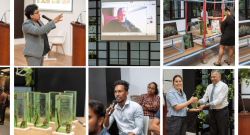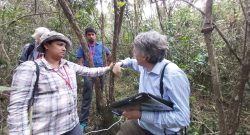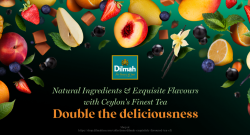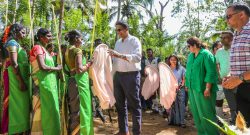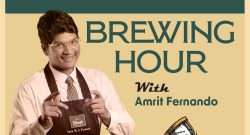Author: Admin
Tea, Shaken & Stirred: The First Ever Dilmah Tea Mixology Playoff in the Maldives
The first ever Dilmah Tea Mixology Playoff in the Maldives held at Kurumba Maldives was an extraordinary celebration of creativity and flavour, showcasing the art of tea-inspired mixology. 22 talented bartenders from resorts across the Maldives competed, crafting exceptional cocktails and mocktails using our finest teas. Presiding over the event were esteemed judges, Mixologist Jay Gray, and Dilmah Chairman/CEO, Tea Grower Dilhan C. Fernando. The competition emphasised the versatility of the Dilmah Elixir of Ceylon Tea, a natural tea extract with built-in sweetness that allows for quick, innovative creations—from cocktails and mocktails to iced teas and smoothies. Congratulations to the outstanding winners:Gold: Depak Thapa (Hilton Maldives Amingiri Resort & Spa)Silver: Nissanka Yomal Silva (Milaidhoo Maldives)Bronze: Eaint Het Phoo Pang (Kuda Villingili Resort)
Understanding Nitrogen Pollution Impacts by using Lichens as Bioindicators
South Asian Nitrogen Hub, University of Peradeniya and Dilmah Tea share outcomes of the project at knowledge sharing event The Dilmah Conservation “Lichens: Nature’s Air Quality Sensor” event, held on 3rd October 2024, highlighted research on nitrogen pollution’s impact on biodiversity and ecosystems in Sri Lanka and South Asia. The event presented the findings of a five-year study led by the South Asian Nitrogen Hub (SANH), the University of Peradeniya, and Dilmah Conservation, focusing on the Rilagala forest near Dilmah’s Climate Change Research Centre. This study is the first to gather high-frequency high-quality continuous ammonia and meteorological data set in Sri Lanka. Another highlight is that the research uses lichens as bioindicators to monitor nitrogen pollution in tropical forests. The research fills a significant gap in understanding nitrogen pollution’s effects, supporting more effective nitrogen management, vital for preserving tropical ecosystems. The event, held at the Genesis Dilmah Centre in Maligawatte, featured regional experts like Dr. Gothamie Weerakoon, Prof. Sarath Nissanka, Prof mark Sutton and Dr. Ajinkya Deshpande, who shared insights from the study. Dr Gothamie Weerakoon (left) on Lichens and Dr Ajinkya Deshpande (right) on the details of the Ammonia Enhancement Project that uses lichens as bioindicators to measure nitrogen pollution Professor Mark Sutton, Director, SANH, joined online from the UK to speak on the global nitrogen pollution problem. He explained that only 20% of nitrogen used in agriculture (from fertiliser and livestock) is efficiently absorbed, with the rest contributing to pollution. Sutton highlighted that nitrogen waste represents both an environmental and economic issue He said, ‘If we take the total value of nitrogen wasted in air and water, which is about 200 million tonnes, and multiply that by USD 1.50 per kilogram of nitrogen, we get approximately USD 300 billion worth of wasted nitrogen resources. In the Colombo Declaration of 2019, the Sri Lankan government committed to the ambition of halving nitrogen waste by 2030. At today’s prices, this would save around USD 150 billion worth of resources each year.’ Sri Lanka’s nitrogen management needs improvement, as noted by Prof. Nissanka, who revealed that the country ranks 131st out of 181 nations in sustainable nitrogen management. One key outcome of SANH’s research was a comprehensive review of Sri Lanka’s nitrogen-related policies, leading to the creation of the National Nitrogen Policy Report. This along with data findings can be used to begin dialogue with different sectors towards setting Nitrogen emissions controls policies. Dr Ajinkya, Environmental Ecologist, UK Centre for Ecology & Hydrology (UKCEH) said, “There is a combined effect of a changing climate and increasing air pollution and these two have a negative impact on sensitive organisms like lichens and moss which would lead to a widespread loss of these species and be extremely harmful for a biodiversity hotspot such as Sri Lanka. So all this put together creates the need for high quality measurements to start seeing what the impacts are and how we can mitigate them.” Dr. Gothamie Weerakoon, Lichen specialist, Natural History Museum, UK explained why lichens are excellent air quality sensors. She pointed out that lichens predate dinosaurs, having appeared over 600 million years ago, and are capable of starting ecological succession. As some of the slowest-growing organisms on Earth, with some specimens as old as 11,000 years, lichens offer valuable long-term insights into environmental changes. Dr. Weerakoon added, “Lichens can tell us what has happened, how temperature has shifted, and how humidity levels have changed.” Buddhika Weerakoon, PHD candidate, University of Peradeniya shared that the research identified around 150 lichen species within the sampling plot, noting significant responses from lichens to elevated ammonia levels. This highlights the rich biodiversity of the area and demonstrates the ability of lichens to act as bioindicators, effectively monitoring air quality and nitrogen pollution. Additionally, research coordinator Tharindu Prabashwara discussed the various challenges and achievements encountered during the project, while field assistants Thathsarani Hemapala, Chamara Udayanga, and Sanjaya Karunarathna shared their hands-on experiences and contributions to the research.
Growing Up in the Tea Gardens
At Dilmah, our journey to crafting exceptional teas begins with a deep-rooted commitment to the communities where our tea is grown. Kahawatte Plantations, nestled amidst the lush landscapes of Sri Lanka, has been central to our heritage for generations. Our dedication to the well-being of our tea harvesters and estate workers extends beyond their immediate needs and into the future of the Kahawatte Plantations community. We believe that education is the cornerstone of a brighter tomorrow. From newborns to university undergrads, we are proud to support the educational aspirations of every youngster in the Kahawatte Plantations. Currently, we provide scholarships to 674 students, of which 397 bright minds are pursuing university degrees. In addition to education, we prioritise the holistic development of young children by providing a comprehensive nutrition programme. Our commitment to kindness has been a cornerstone of Dilmah’s philosophy for over three decades. A significant portion of our pre-tax profits – actually 15% – is allocated to initiatives that improve the lives of people and protect the environment. Check out https://youtu.be/PArW7P6htV4?si=SsSG8qJ4t5r0MuoE to learn more about our programmes for children.
Knowledge Session: Lichens as Air Quality Sensors
Dilmah, in collaboration with the University of Peradeniya, has been partnering for several years with the South Asian Nitrogen Hub (SANH) on a groundbreaking study examining the impact of ammonia on tropical forest ecosystems. This research sheds light on how nitrogen pollution affects biodiversity and ecosystem health, making it a breakthrough regional study in Sri Lanka and South Asia. Filling a major gap in scientific knowledge and data availability, this project has provided the first ever research-quality ammonia monitoring and meteorological data from our region. More details about the progress of this study can be gleaned from the research team who will present insights and key findings on October 3rd, 2024, from 2.30pm to 5.00 pm at the upcoming event “Lichens: Natural Air Quality Sensors,” at the Genesis: Dilmah Centre for A Sustainable Future in Maligawatte. Lichens, known for their sensitivity to air pollutants, have been used in the project as bioindicators (species with the ability to measure the quality of the environment) to track nitrogen levels. The event aims to showcase how these organisms help us understand the broader implications of nitrogen pollution on tropical forests and its potential long-term impact on environmental sustainability. Renowned Sri Lankan lichenologist, Dr. Gothami Weerakoon, curator at the Natural History Museum in London, will present her findings on the use of lichens as bioindicators. Dilmah has previously worked with her on a Dilmah publication “Fascinating Lichens of Sri Lanka”. This event will also feature insights from the larger regional study led by Prof. Mark Sutton, and from the Sri Lanka-focused research headed by Prof. S.P. Nissanka of the University of Peradeniya. The audience will further hear from Dr Ajinkya Deshpande environmental ecologist from UKCEH with a background in climate change effects, forest ecology, pollution effects and air quality monitoring who will attempt to bring to life the project’s impact in numbers. Register here: https://forms.gle/oCANwGfz3MuvyNbs6
Pioneering Sustainability for a Greener Tomorrow
Highlights from Biodiversity Sri Lanka’s 9th AGM and CEO Forum In August 2012, Biodiversity Sri Lanka (BSL) was founded as a unique initiative by the Ceylon Chamber of Commerce (CCC), in collaboration with the International Union for Conservation of Nature (IUCN) and Dilmah Conservation. The goal was simple yet profound: to unite the private sector in championing conservation and sustainability in Sri Lanka. Since its inception, BSL has become a beacon for sustainability-driven business practices, fostering a community of organisations striving to balance economic progress with environmental preservation. Fast forward to today, BSL recently hosted its 9th Annual General Meeting and CEO Forum, featuring an engaging panel discussion titled “Redefining Global Business: Pioneering Sustainability for a Greener Tomorrow.” The panel brought together three prominent voices in sustainability—Ms. Yvonne Zhang from Deloitte Singapore, Mr. Vinodh Hirdaramani, Chairman of Hirdaramani Group, and Mr. Dilhan Fernando, Chairman of Dilmah Ceylon Tea Company (see in above photo). Shifting Perspectives on Investment During the forum, the panelists highlighted the evolving approach to business investments, especially in today’s unpredictable world. Traditionally, investments were centered around stability and predictability. But as Ms. Yvonne Zhang aptly noted, “We do not have stability anywhere in the world anymore. We wish we do. But we are in an unpredictable world now because of climate change and economic cycles.” This shift has led businesses to rethink sustainability—not merely as “the right thing to do” but as a long-term value proposition essential for navigating uncertainty. Companies that embed sustainability into their core operations are better equipped to adapt to challenges brought about by climate change and fluctuating economic trends. Sustainability as an Investment, Not a Cost One of the key takeaways from the forum was that sustainability should not be viewed as a cost that requires compensation. As Ms. Zhang explained, “If there is potential for longevity in a business, then there is investment value.” In other words, sustainability is a growing necessity—one that businesses must address to stay relevant and competitive. Mr. Vinodh Hirdaramani shared his firsthand experience as a pioneer in corporate sustainability initiatives. He highlighted that investing in a sustainable factory cost 30-35% more than a traditional one, yet the decision was driven by long-term thinking. “Sustainable initiatives will always include a cost,” he remarked, “but sustainability is all about long-term thinking.” For forward-thinking companies, sustainability presents more than just a way to manage risks. It opens doors to innovation, the creation of new markets, and builds trust with consumers who are increasingly aware of the environmental and social impacts of the products and services they choose. Consumer Involvement in Corporate Sustainability Ethics Interestingly, consumer involvement in corporate sustainability ethics has surged in recent years. As Mr. Dilhan Fernando pointed out, just five years ago, many businesses hesitated to invest in these principles. However, companies are now facing the consequences of neglecting sustainable practices, which has compelled them to adopt ethical standards in their business strategies. The shift is clear—today’s consumers demand greater accountability and responsibility from the companies they support, transforming sustainability from a niche concern into a fundamental driver of business success. Conclusion As the 9th Annual general Meeting and CEO Forum of Biodiversity Sri Lanka concluded, it was clear that businesses must fundamentally rethink how they invest in sustainability. The discussions underscored that integrating sustainable practices into business models is no longer a mere option—it’s an essential step toward creating a greener and more resilient future.
Into the Land of Magical Dilmah Tea
Get ready to Double the Deliciousness with our Exquisitely Flavoured Tea. Why do we say that? It’s because we use the finest Single Region Ceylon Tea together with the best ingredients. When those two worlds of amazing taste adventure collide, you can experience one of the finest beverage experiences. Legend has it that this tea comes from a magical family-owned tea garden that handpicks and handcrafts each of these wonderful teas. You will have to taste it to believe it! Shop at – https://shop.dilmahtea.com/collections/dilmah-exquisitely-flavoured-tea-eft
The Ergonomic Basket Project
Here’s another success story from our tea gardens! One of our recent initiatives to support our tea harvesters at Kahawatte Plantations (KWPL) has been to develop ergonomic baskets. They help to prevent freshly picked tea leaves from getting crushed or destroyed during the harvesting process, while being lightweight and lessening the strain on the tea picker. Over the last two years, we have produced over 1,000 ergonomic baskets for the upper and lower regions of KWPL. In 2024, we decided to extend this project to our retired plantation workers, empowering them with the skills and materials to produce the baskets themselves. Not only does it ensure our retired workers a regular income, but it also creates an environment for them to be active and enterprising. As members of our Small Entrepreneurs Programme, our enthusiastic team hopes to produce over 2,000 ergonomic baskets this year! Check out https://www.youtube.com/watch?v=S9LPgiQaDeg to watch the story come alive.
Brewing Hour with Amrit Fernando
Tune in every Thursday for an hour of tea and music-filled fun as Amrit, Dilmah 3rd gen, brings you the latest all-to-know-about-Dilmah, exclusive tea recipes, and his top song picks. Don’t miss out on this exciting segment at 10 AM IST | 2 PM ACST | 4.30 PM NZST | 4.30 AM GMT. Recap airing every Saturday at 10 AM IST | 2 PM ACST | 4.30 PM NZST | 4.30 AM GMT. To listen, tune in to www.tearadio.comNow Streaming on Amazon Alexa Devices & Google Home.


